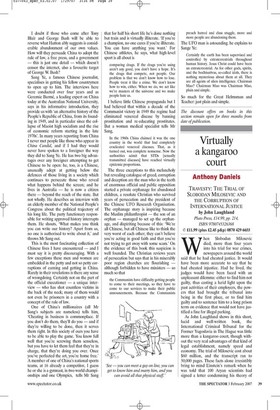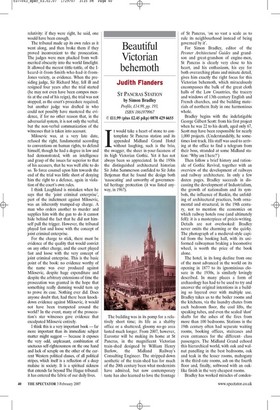Virtually a kangaroo court
Anthony Daniels TRAVESTY: THE TRIAL OF SLOBODAN MILOSEVIC AND THE CORRUPTION OF INTERNATIONAL JUSTICE by John Laughland Pluto Press, £14.99, pp. 214, ISBN 9780745326368 © £11.99 (plus £2.45 p&p) 0870 429 6655 Ivhen Slobodan Milosevic died, more than four years into his trial for war crimes, newspapers around the world said that he had cheated justice. It would have been more accurate to say that he had cheated injustice. Had he lived, the judges would have been faced with an unpleasant dilemma: either to find him not guilty, thus casting a lurid light upon the past activities of their employers, the powers that had brought the tribunal into being in the first place, or to find him guilty and to sentence him to a long prison term on evidence that would not have justified a fine for illegal parking.
As John Laughland shows in this short, lucid and well-written book, the International Criminal Tribunal for the Former Yugoslavia in The Hague was little more than a kangaroo court, though without the very real advantages of that kind of legal establishment, namely speed and economy. The trial of Milosevic cost about $60 million, and the transcript ran to 50,000 pages. These facts alone irresistibly bring to mind Einstein's remark when he was told that 100 Aryan scientists had signed a letter condemning his theory of relativity: if they were right, he said, one would have been enough.
The tribunal made up its own rules as it went along, and then broke them if they proved inconvenient to the prosecution. The judges were men plucked from wellmerited obscurity into the world limelight. It allowed the merest tittle-tattle, of the Iheard-it-from-Smith-who-had-it-fromJones variety, as evidence. When the presiding judge, Sir Richard May, fell ill and resigned four years after the trial started (he may not even have been compos mentis at the end of his reign), the trial was not stopped, as the court's procedure required, but another judge was drafted in who could not possibly have mastered the evidence, if for no other reason that, in the adversarial system, it is not only the verbal, but the non-verbal communication of the witnesses that is taken into account.
Milosevic was, at a very late date, refused the right, fundamental according to conventions on human rights, to defend himself, though he had a degree in law and had demonstrated, with an intelligence and grasp of the issues far superior to that of his accusers, that he was well able to do so. To force counsel upon him towards the end of the trial was little short of denying him the right to a defence, again in violation of the court's own rules.
I think Laughland is mistaken when he says that the 'joint criminal enterprise', part of the indictment against Milosevic, was an inherently trumped-up charge. A man who orders another to murder and supplies him with the gun to do it cannot hide behind the fact that he did not himself pull the trigger. However, the tribunal played fast and loose with the concept of joint criminal enterprise.
For the charge to stick, there must be evidence of the quality that would convict on any other charge, and the court played fast and loose with the very concept of joint criminal enterprise. This is the basic point of the book: no evidence worthy of the name was ever produced against Milosevic, despite huge expenditure and despite the arbitrary extensions of time the prosecution was granted in the hope that something really damning would turn up to prove its case. Nothing ever did. Does anyone doubt that, had there been knockdown evidence against Milosevic, it would not have been trumpeted around the world? In the event, many of the prosecution's star witnesses gave evidence that exculpated Milosevic entirely.
I think this is a very important book — far more important than its immediate subject matter might suggest — because it exposes the very odd, unpleasant, combination of unctuous self-righteousness on the one hand and lack of scruple on the other of the current Western political classes, of all political stripes, which itself is a reflection of a deep malaise in society. It is a spiritual sickness that extends far beyond The Hague tribunal: it has entered the fabric of our daily lives.





















































 Previous page
Previous page